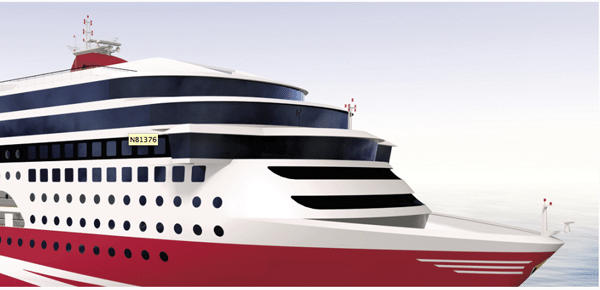Israeli Forces Seize Gaza Aid Boat Carrying Greta Thunberg
Israeli naval forces boarded and seized a charity vessel carrying Swedish activist Greta Thunberg, which had tried to break the naval blockade of the Gaza Strip on Monday.

Northern Europe’s leading industrial gas company, AGA Gas AB, and Viking Line have signed an agreement on delivery of liquefied natural gas (LNG) to Viking Line’s new passenger with its environmental profile that is a forerunner within shipping.
“AGA’s and Viking Line’s investment means major environmental gains in comparison to traditional maritime fuel”, says Jan Bäckvall, Head of Europe North in Linde and responsible for AGA”. “For Baltic shipping, this can be the primary solution in the future”.
Viking Line’s newbuilding “NB 1376”, recently named the M/S Viking Grace, will provide service on the Stockholm (Sweden) – Ã…land Islands (Finland) – Turku (Finland) route beginning in January 2013. The vessel, currently under construction at the STX Europe shipyard in Turku, will be Viking Line’s largest passenger ferry and will be powered by LNG. The liquefied gas will be stored in specially built tanks at the rear of the vessel and will have a temperature of about -150 degrees Celsius when it is bunkered and stored on board.
LNG contains neither sulphur nor heavy metals. By using this fuel a vessel reduces its carbon dioxide emissions by 20-30 percent compared to oil. LNG meets the emission standards of the International Maritime Organization (IMO) directive, which states that the sulphur content of vessel fuel may not exceed 0.1 per cent by weight starting on January 1, 2015.
“Viking Line’s environmentally conscious investment is an important ‘flagship’ for the shipping industry and a cleaner Baltic Sea. Proximity to the LNG terminal, with flexible and reliable deliveries, as well as AGA’s knowledge of cryogenic, environmentally friendly fuel and bunkering technology makes AGA a natural partner in this pioneering project,” says Mikael Backman, President and CEO.
The vessel’s consumption of LNG is estimated at 22,500 tonnes annually, or about 60 tonnes per day. AGA will supply the liquefied natural gas from AGA’s LNG terminal in Nynäshamn, which opened in 2011.
Planning, projecting and permission for bunkering (refueling) of the vessel at StadsgÃ¥rden in Stockholm is in progress, however in speaking with Tony Öhman, Viking Line’s VP of Marine Operations, this morning, the bunkering process will consist of an LNG fuel barge coming alongside the ship, similar to how traditional ships would on-load heavy fuel oil.
Want to know more about this vessel’s propulsion plant? Click HERE for more info.
Facts about LNG:

Sign up for gCaptain’s newsletter and never miss an update

Subscribe to gCaptain Daily and stay informed with the latest global maritime and offshore news


Stay informed with the latest maritime and offshore news, delivered daily straight to your inbox
Essential news coupled with the finest maritime content sourced from across the globe.
Sign Up